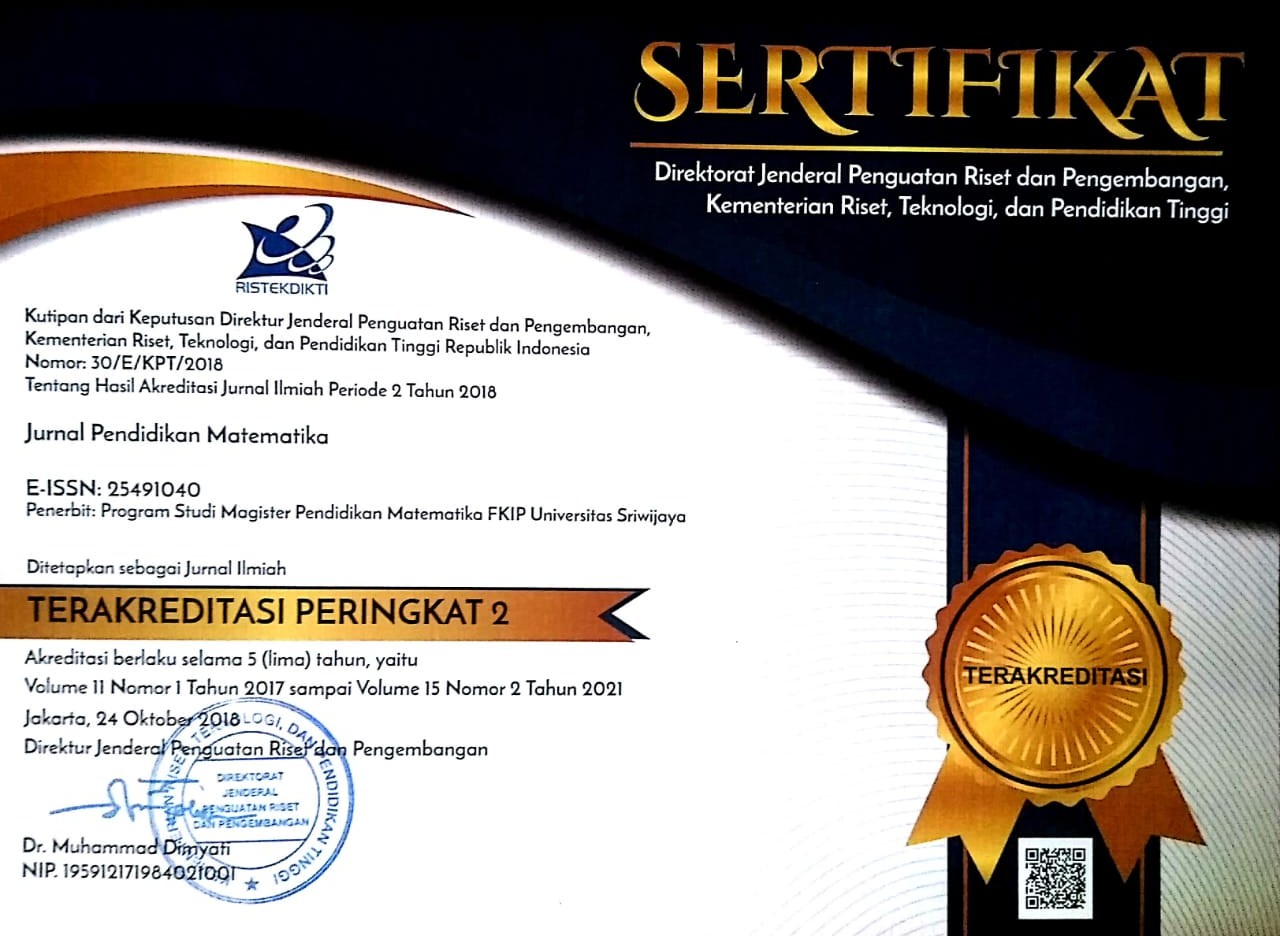Development of PISA-like Activities using the Inquiry-based Learning Model and the Context of Religious Holidays during the Pandemic
Abstract
This research aims to develop a PISA-type content quantity that uses the context of religious holidays during the pandemic that is valid, practical, and potentially affects mathematical literacy skills. This research uses development research with two stages: preliminary and formative evaluation. This research also uses Inquiry-Based Learning (IBL) model in the learning process. This study involved eighth-grade students aged 13-15 years of various abilities. Data collection and analysis techniques were documentation, walkthroughs, observation, interviews, and tests. The research was carried out offline and online (Zoom and WhatsApp Group (WAG)). In this study, sharing activities were produced as well as a PISA-type jumping task with content quantity characteristics in the context of religious holiday during the pandemic by the PISA 2022 framework where what needs to be considered are mathematical literacy skills and use of language that is by language standards that can be applied and well interpreted by the students. Based on the students' answers, it can be seen that the questions and activities are included in the practical category because they can be solved well by students. From the results, it can be concluded that the developed PISA-like numeracy and activity has a potential effect on mathematical literacy skills and life in the context of religious days during the pandemic. In addition, IBL model can improve students' communication skills in solving PISA-type math problems and activities.
Keywords
Full Text:
PDFReferences
Afriyanti, I., Wardono, W., & Kartono, K. (2018). Development of mathematical literacy refers to pisa through technology-based 21st century learning [In Bahasa]. In PRISMA, Prosiding Seminar Nasional Matematika, 608–617. https://demo.dspacedirect.org/bitstream/handle/10673/1982/artikel pengembangan literasi matematika.pdf
Artigue, M., & Blomhøj, M. (2013). Conceptualizing inquiry-based education in mathematics. ZDM, 45(6), 797–810. https://doi.org/10.1007/s11858-013-0506-6
Bakker, A. (2018). Design research in education: A practical guide for early career researchers. London: Routledge.
Bayram, Z., Oskay, Ö. Ö., Erdem, E., Özgür, S. D., & ?en, ?. (2013). Effect of Inquiry based Learning Method on Students’ Motivation. Procedia - Social and Behavioral Sciences, 106, 988–996. https://doi.org/10.1016/j.sbspro.2013.12.112
Dobber, M., Zwart, R., Tanis, M., & van Oers, B. (2017). Literature review: The role of the teacher in inquiry-based education. Educational Research Review, 22, 194–214. https://doi.org/10.1016/j.edurev.2017.09.002
Hawa, A. M. (2014). Analysis of students’ ability to solve math problems of PISA type [in Bahasa]. Seminar Nasional Evaluasi Pendidikan II Tahun 2014, 890–900. https://conf.unnes.ac.id/index.php/snep/II/paper/viewFile/269/163
Jannah, R. D., Putri, R. I. I., & Zulkardi, Z. (2019). Soft tennis and volleyball contexts in asian games for PISA-like mathematics problems. Journal on Mathematics Education, 10(1), 157–170. https://doi.org/10.22342/jme.10.1.5248.157-170
Kemenkes. (2020). Guidelines for preparedness for novel coronavirus infection (2019-nCov) [In Bahasa]. Jakarta: Directorate of Disease Prevention and Control.
Maaß, K., & Doorman, M. (2013). A model for a widespread implementation of inquiry-based learning. ZDM, 45(6), 887–899. https://doi.org/10.1007/s11858-013-0505-7
Marshall, J. C., Smart, J. B., & Alston, D. M. (2017). Inquiry-based instruction: a possible solution to improving student learning of both science concepts and scientific practices. International Journal of Science and Mathematics Education, 15(5), 777–796. https://doi.org/10.1007/s10763-016-9718-x
Murtiyasa, B. (2015). The challenges of learning mathematics in the global era [in Bahasa]. Prosiding Seminar Nasional Matematika Dan Pendidikan Matematika UMS, 28–47. https://publikasiilmiah.ums.ac.id/bitstream/handle/11617/6005/28_47%20PROF%20BUDI%20M.pdf
Nieveen, N., & Folmer, E. (2013). Formative evalution in educational design research. Design Research, 153, 152–169. https://www.ida.liu.se/~961G29/matr/didaktik/edr.pdf#page=154
Noviana, K. Y., & Murtiyasa, B. (2020). PISA oriented mathematical literacy ability content quantity in middle school students [in Bahasa]. JNPM (Jurnal Nasional Pendidikan Matematika), 4(2), 195–211. http://jurnal.ugj.ac.id/index.php/JNPM/article/view/2830/2096
Nusantara, D. S., Zulkardi, Z., & Putri, R. I. I. (2020). Designing PISA-like mathematics problem relating change and relationship using physical distancing context. Journal of Physics: Conference Series, 1663(1), 012004. https://doi.org/10.1088/1742-6596/1663/1/012004
Nusantara, D. S., Zulkardi, & Putri, R. I. I. (2021a). Designing PISA-like mathematics problem using a COVID-19 transmission map context. 020005. https://doi.org/10.1063/5.0071596
Nusantara, D. S., Zulkardi, Z., & Putri, R. I. I. (2021b). Designing PISA-like mathematics task using a covid-19 context (Pisacomat). Journal on Mathematics Education, 12(2), 349–364. https://doi.org/10.22342/jme.12.2.13181.349-364
OECD. (2016). PISA 2015: PISA results in focus. Paris : OECD Publishing. https://www.oecd.org/pisa/pisa-2015-results-in-focus.pdf
OECD. (2018). PISA 2021 Mathematics Framework (draft). https://pisa2021-maths.oecd.org/files/PISA 2021 Mathematics Framework Draft.pdf
OECD. (2019). PISA, 2018: Insights and interpretations. Paris : OECD Publishing. https://www.oecd.org/pisa/PISA 2018 Insights and Interpretations FINAL PDF.pdf
Putri, R. I. I., & Zulkardi, Z. (2018). Higher-order thinking skill problem on data representation in primary school: A case study. Journal of Physics: Conference Series, 948, 012056. https://doi.org/10.1088/1742-6596/948/1/012056
Putri, R. I. I., & Zulkardi, Z. (2020). Designing PISA-like mathematics task using asian games context. Journal on Mathematics Education, 11(1), 135–144. https://doi.org/10.22342/jme.11.1.9786.135-144
Sanjaya, W. (2006). Learning in the Implementation of Competency-based Curriculum [in Bahasa]. Jakarta: Kencana.
Silviani, T. R., Jailani, J., Lusyana, E., & Rukmana, A. (2017). Efforts to increase interest in learning mathematics using inquiry based learning setting group investigation [in Bahasa]. Kreano, Jurnal Matematika Kreatif-Inovatif, 8(2), 150–161. https://doi.org/10.15294/kreano.v8i2.8404
Widianti, W., & Hidayati, N. (2021). Analysis of middle school students’ mathematical literacy ability on triangle and quadrilateral material [In Bahasa]. JPMI (Jurnal Pembelajaran Matematika Inovatif), 4(1), 27–38. https://www.journal.ikipsiliwangi.ac.id/index.php/jpmi/article/view/6369/2123
Zulkardi. (2002). Developing a Learning Environment on Realistic Mathematics Education For Indonesian Student Teachers. Enschede: Universiteit Twente.
Zulkardi, Z., & Kohar, A. W. (2018). Designing PISA-like mathematics tasks in Indonesia: Experiences and Challenges. Journal of Physics: Conference Series, 947, 012015. https://doi.org/10.1088/1742-6596/947/1/012015
Zulkardi, Z., Meryansumayeka, M., Putri, R. I. I., Alwi, Z., Nusantara, D. S., Ambarita, S. M., Maharani, Y., & Puspitasari, L. (2020). How students work with PISA-like mathematical tasks using COVID-19 context. Journal on Mathematics Education, 11(3), 405–416. https://doi.org/10.22342/jme.11.3.12915.405-416
DOI: https://doi.org/10.22342/jpm.17.1.17765.37-54
Jl. Srijaya Negara, Bukit Besar
Palembang - 30139 Indonesia
Jurnal Pendidikan Matematika is licensed under a Creative Commons Attribution-NonCommercial-ShareAlike 4.0 International License.
Indexed in:


